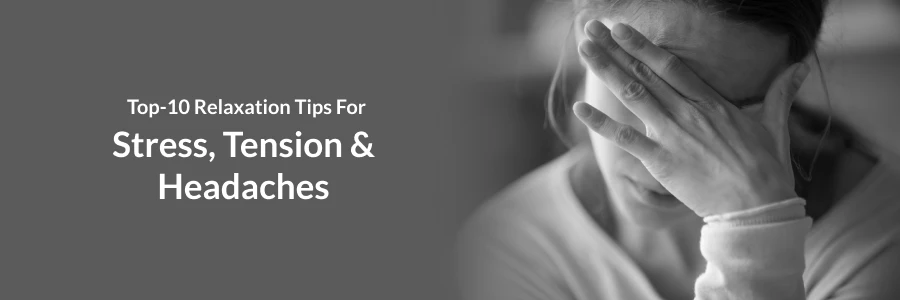- Cardiology 84
- Dermatology 45
- Endocrinology 33
- ENT 16
- Fertility 190
- Gastroenterology 78
- General-Medicine 81
- Gynecology 80
- Hematology 19
- Infectious-Diseases 33
- Neurology 52
- Oncology 34
- Ophthalmology 23
- Orthopedics 69
- Pediatrics 31
- Procedure 23
- Public-Health 144
- Pulmonology 59
- Radiology 8
- Urology 68
- Wellness 161
- Woman-and-child 77

Relaxation Tips for Stress, Tension, and Headaches
Stress and tension are often unavoidable in life, affecting us at work, home, and in relationships. They can stem from various sources, including medical conditions and financial situations. While external factors can trigger stress, much of it originates from our own thoughts and attitudes.
Learning to manage stress internally can significantly improve well-being, even when external circumstances are challenging.
10 Tips to Relieve Stress & Tension
- Release muscle tension: Pay attention to your body and consciously relax tight muscles, especially in your face and scalp. Repeat until the tension dissipates.
- Practice good posture and deep breathing: Straighten your posture and take slow, deep breaths to calm yourself when feeling agitated.
- Hydrate: Drink water or warm milk to relax, especially before bedtime if feeling anxious.
- Challenge negative thoughts: Often, stress is exacerbated by unrealistic thoughts. Challenge them with positive thinking to find new solutions.
- Communicate: If others contribute to your stress, talk to them openly. They may need to realise their impact.
- Find humor: Engage in activities that make you laugh, like watching a comedy or listening to music.
- Take a walk: Step outside for a walk to clear your mind and reduce stress levels.
- Exercise regularly: Physical activity helps lower stress levels significantly. Find an activity you enjoy, like swimming or going to the gym.
- Prioritise tasks: Avoid overwhelming yourself with too many activities. Plan and tackle tasks one at a time.
- Practice self-care: Be kind to yourself. Avoid self-imposed pressure and take breaks when needed.
Natural Ways to Relieve Headaches
Understanding the type and cause of your headache is crucial for effective relief. Common types include tension headaches, migraines, and sinus headaches. While over-the-counter medications are common, natural remedies can also be effective.
Here are natural remedies for various types of headaches.
- Tension Headaches Often feel like a tight band around the forehead. Manage with relaxation techniques and stress reduction.
- Migraines: Natural approaches include identifying trigger foods like processed meats, aged cheeses, and caffeine.
- Sinus Headaches: Address underlying sinus issues with natural remedies like saline nasal rinses.
- Cluster Headaches: Seek relief through relaxation techniques and minimising triggers like alcohol and smoking.
Foods to Avoid for Managing Stress, Tension and Headaches
- Processed meats: Contains additives and preservatives that may trigger headaches.
- Aged cheeses: Contains tyramine, which can contribute to headaches, especially migraines.
- Caffeine: Excessive caffeine intake can lead to dehydration and trigger headaches.
- Alcohol: It can dehydrate the body and act as a headache trigger for some individuals.
- Artificial sweeteners: Some people are sensitive to artificial sweeteners like aspartame, which can trigger headaches.
- Salty snacks: High sodium intake can lead to dehydration, which may exacerbate headaches.
- Foods high in histamine, Such as fermented foods, pickled foods, and certain aged cheeses, can trigger headaches in sensitive individuals.
Avoiding these foods, especially if you notice they correlate with your stress levels or headaches, can help to manage these conditions. Always consult with a specialist for personalised advice.
Ready to take control of your health journey? Book your appointment now and start your path towards wellness today!
Book an AppointmentConclusion
Managing stress and headaches involves understanding their triggers and adopting healthy coping mechanisms. By incorporating relaxation techniques, regular exercise, and a balanced lifestyle, you can significantly improve your overall well-being and reduce the impact of stress on your life.
Frequently Asked Questions
Citrus fruits like oranges, grapefruit, and other citrus fruits are high in vitamin C, which has been shown in tests to reduce stress levels. Vitamin C is also a potent antioxidant that helps to strengthen your immune system. In the afternoon, eat an orange for a relaxing and nourishing snack.
Here are simple ways to stop taking stress:
- Exercise
- Reduce the intake of caffeine
- Spend more time with family and friends
- Laugh loud
- Avoid excessive consumption of alcohol and smoking
Nutrients found in a variety of foods may help you cope with stress. Matcha powder, fatty salmon, kimchi, garlic, chamomile tea, and broccoli are just a few examples of foods that may aid in stress relief. Incorporating some of these foods and beverages into your diet can naturally promote stress alleviation.
Mindfulness techniques focus on staying present in the moment and can be effective in reducing stress and headaches.
Yes, yoga combines physical postures, breathing exercises, and meditation to promote relaxation and reduce tension.
Essential oils like lavender or peppermint can be used in aromatherapy to calm the mind and ease headache symptoms.
Getting enough sleep each night helps the body recover from stress and reduces the frequency of tension headaches.

- Cardiology 2132
- Dermatology 168
- Endocrinology 135
- ENT 97
- Fertility 217
- Gastroenterology 232
- General 478
- General-Medicine 1685
- Gynecology 169
- Hematology 85
- Infectious-Diseases 208
- Neurology 207
- Oncology 345
- Ophthalmology 65
- Orthopedics 187
- Pediatrics 83
- Procedure 72
- Public-Health 209
- Pulmonology 126
- Radiology 13
- Second Opinion 311
- Urology 294
- Wellness 600
- Woman-and-child 447
- Others 10217
Related Blogs
If you have any questions, please fill out the enquiry form or call us, and we will get back to you promptly.
040-68334455